Dizziness: How to Care for Your Child
Kids with dizziness may feel lightheaded or off-balance. Dizziness usually goes away on its own. When your child is dizzy, you can help prevent injuries from falls.


-
If your health care provider prescribed medicine, give it to your child as directed.
-
If your child continues to feel dizzy, have them:
-
Lie down with their eyes closed.
-
Stand up slowly after sitting or lying down for a long time.
-
Avoid moving or turning the head quickly.
-
Avoid bending over to touch the floor.
-
Avoid bending the neck back.
-
Drink plenty of fluids.
-
To prevent falls if dizziness continues:
-
Your child shouldn't do activities that need balance or that could cause a fall (like riding a bike or climbing monkey bars) until your health care provider says it's OK.
-
Clear the floors of clutter and loose rugs.
-
Use nightlights.
-
Older kids should take baths instead of showers.
-
Follow the instructions about when your child may return to school, child care, or other activities.
-
Schedule a follow-up visit with your health care provider as directed.

Your child:

Your child:

What does dizziness feel like? Dizziness can be a woozy feeling like being off-balance or feeling lightheaded. Dizziness also can be a spinning feeling called vertigo. The feeling may be constant or come and go. Vision or hearing problems, nausea, headaches, or tiredness may happen along with the dizziness.
Young kids who can't describe these feelings might vomit, look pale, be irritable, not want to move, walk unsteadily (with feet wide apart), or have twitching eye movements.
Why does dizziness happen? Nerves and other parts of the inner ears work with the brain, eyes, joints, and muscles to keep us steady and upright. Dizziness happens when one or more of these aren't working well. Dizziness can be triggered by infections, low blood pressure, low blood sugar, migraines, or ear problems. Dehydration, anemia, anxiety, and hyperventilation can also cause dizziness.
How do health care providers treat dizziness? Health care providers do an exam to see what's causing the dizziness. Treatment will depend on what they find. In most cases, dizziness eventually gets better on its own. If dizziness continues, medicine, physical therapy, or surgery might help manage symptoms. Sometimes, special testing is needed.